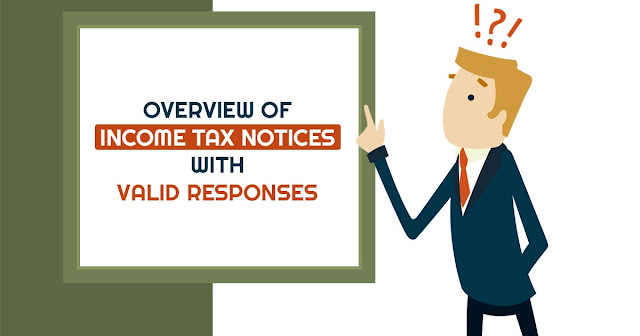Nobody wants to be served with an income tax notice. This is the most common worry that maximum taxpayers have. Therefore, learning about such notices and making yourself aware about its purpose can relieve much of the associated worry. Tax authorities issue notices for a range of reasons, and not all bring trouble to you. In this detailed article, various types of income tax notices, their meanings, and awareness taxpayers need to know are discussed. Moreover, this article also guides you on how to respond to these notices under the compliance of the recent tax laws.
Statement Under Section 143(1):
The Income Tax Department has released a statement under Section 143(1), which is one of the most common notices served. It is not about any audit or conducting scrutiny notice but rather an announcement confirming the tax return processed by the taxpayer. Details about income, claimed deductions, and tax calculations are mentioned in this notice. Also, any adjustments made by the tax authorities mentioned here In the event that no errors or discrepancies are found, be rest assured that you need not take any action. But if the tax authorities find any defects, you need to take action in order to rectify or correct the errors.
Attention for Scrutiny Assessment Notice
A scrutiny assessment notice is sent after a thorough analysis of a taxpayer’s income and deductions is conducted. Usually, it is sent when a department notices a potential discrepancy or has to confirm a certain set of transactions. The notice will outline any data or records that must be supplied by the taxpayer. It is crucial that you respond to this letter within the specified timeframe and include the necessary details in order to prevent any penalties or further investigation.
Notice Regarding Best Judgment Assessment:
In the case of a taxpayer's failure to submit their income tax return or respond to the scrutiny assessment notification, the tax authorities possess the authority to initiate a best judgement assessment. In such circumstances, the tax officer will estimate the taxpayer's income and deductions based on the available information. To avoid encountering this issue, it is crucial to comply with previous notices and provide accurate information.
Issue of Notice for Reassessment
If the tax office suspects that a taxpayer's income has evaded assessment, they will issue a reassessment notification. This may occur if the taxpayer has not disclosed their income, filed their taxes incorrectly, or for any other valid reason that justifies reassessing their tax liability. The notification presents an opportunity for the taxpayer to present their case and includes an explanation of the factors leading to the reassessment. When responding to such notices, seeking expert advice is advisable to ensure compliance and mitigate potential legal consequences.
Notice Regarding Outstanding Tax Claim
In cases where a taxpayer has an outstanding tax liability, including interest and penalties, a notice of demand for unpaid tax will be sent. This notice specifies a deadline for payment and the precise amount owed. Failure to heed this warning may result in further legal actions, such as asset seizure or prosecution. Acting promptly by making the required payment or requesting an instalment plan, if unable to pay the full amount at once, is of utmost importance.
Notice for Conducting Survey or Investigation:
If there are suspicions of tax evasion or other irregularities, the tax authorities may issue a notification to conduct a survey or investigation. This notification grants the tax officers permission to inspect the taxpayer's property or gather additional information pertaining to their financial transactions. It is crucial to cooperate with the authorities by providing the necessary documentation and justifications. To protect your rights and interests throughout this process, seeking expert guidance is highly recommended.
What to Do About Income Tax Notices?
- Carefully Read and Understand the Notice: Read the notification completely to understand its purpose as well as the exact details or instructions it wants from you. Note the due date for your response or the delivery of the required papers.
- Obtain Documentation: Gather all the necessary papers and records that are related to the notification. Make sure the information you offer is true, full, and backed up by the necessary papers.
- Consult a Qualified Tax Professional: If you need assistance in understanding the notice or if you are unsure of how to respond. They can walk you through the procedure, assist you in putting together an appropriate answer, and, if necessary, represent you in front of the tax authorities.
- Respond by the Deadline Specified: In the case of income tax notices in particular, it is critical to respond before the deadline. Penalties, additional tax costs, or legal repercussions may result from failing to react or missing the deadline. Keep in mind to submit your response within the allotted window of time.
- Keep Copies of All Correspondence: You should continue to keep copies of all correspondence, including the notice, your reply, and any supporting documents. By doing so, you'll be able to keep a record of the conversation and use it as proof if necessary in the future.
Final Remarks
Receiving an income tax notice should not incite panic. It is essential to have a clear comprehension of the various types of notices and their underlying significance. By promptly addressing the notice, ensuring the provision of precise and truthful information, and seeking the guidance of qualified professionals when necessary, one can effectively navigate the notice and adhere to tax regulations. It is important to emphasise that cooperation and timely action play a pivotal role in successfully resolving any tax-related matters that may arise. By approaching the situation with a proactive mindset, taxpayers can confidently manage their tax responsibilities and maintain compliance.


Comments
Post a Comment